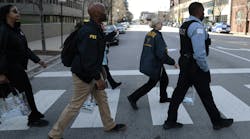A federal judge on Friday approved a historic settlement between the city and the Department of Justice to overhaul the Seattle Police Department, paving the way for far-reaching reforms to curtail excessive force.
But U.S. District Judge James Robart in Seattle made his ruling provisional, saying he wanted the settlement modified to give him a greater role in the selection of a court-appointed monitor and more information on how the agreement is working as it progresses.
Robart's ruling represents just a beginning. The agreement is clouded by lingering skepticism in the police union and rank-and-file over changes that only emerged after what both sides described as roughly 100 hours of "intense, contested" negotiations.
Also unresolved is the appointment of the monitor, who will assume the crucial job of overseeing implementation of the settlement, assuring the city's compliance and providing periodic progress reports to the community.
Both sides have 60 days from Monday to agree on a monitor, although, according to sources, preliminary talks have already begun with a former monitor who oversaw police reforms in Cincinnati.
The agreement was announced July 27, more than seven months after the Justice Department issued a scathing report that found Seattle police officers had engaged in a "pattern or practice" of excessive force and cited troubling evidence of biased policing against minorities.
The findings grew out of series of high-profile clashes between citizens and police, some captured on video, including the fatal shooting of woodcarver John T. Williams in 2010.
City officials disputed the conclusions, but agreed on the need for reforms, averting a federal civil-rights suit to compel the department to make changes.
"Voluntary and mutually agreeable implementation of reforms," federal and city attorneys wrote in court papers submitted to Robart before Friday's hearing, "is more likely to conserve public resources and result in beneficial change than the uncertainties of litigation or an order of this Court imposed at the end of protracted litigation."
The settlement reaches into almost every aspect of how police officers interact with citizens, from casual contact to the use of deadly force. It also includes creation of a Community Police Commission to review the monitor's work and ensure citizen involvement in the reforms.
Among the conditions of the agreement is that officers be specifically trained to use each weapon they carry and report any force that results in injury or a complaint. The more force used, the more detailed the reporting requirements and the greater the scrutiny it will receive.
Included is a requirement that officers will have to file a use-of-force report when they point a gun at someone, something the department did not require in the past.
The agreement also calls for officers to look for ways to de-escalate confrontations and, within safe bounds, decrease their use of force.
In its findings, the Justice Department alleged that illegal force was most often used against people of color and those who were either mentally or chemically impaired.
As part of the settlement, the Police Department also will establish a Crisis Intervention Committee to focus on training, researching best practices, and providing officers with new and additional resources to deal with the mentally ill on the streets.
Mayor Mike McGinn, who became intensely involved in the negotiations just as a July 31 deadline loomed and after prodding from City Attorney Pete Holmes, will appoint members of the commission with the approval of the City Council.
The commission will review the monitor's semiannual reports to the court, hold public meetings, make recommendations to the city, and engage the community in police reforms. It also will review possible changes to the department's internal-investigations structure.
The city has agreed to set aside $100,000 to help hire the monitor, who will be allowed to hire staff and may incur other expenses. The monitor will report to Robart, who will retain authority over the settlement.
The former Cincinnati monitor, Saul Green, a Detroit lawyer with considerable public-service experience, has been under consideration for the same job in Seattle for some time, according to sources. He oversaw reforms of Cincinnati's police in the 2000s after a Justice Department investigation.
There, Green brought in a team to improve police practices, meeting considerable resistance from law enforcement. However, six years after he began, Green issued his final monitoring report and declared the process "one of the most successful police reform efforts ever undertaken."
Green served as a U.S. attorney in Michigan from 1994 to 2001 and as Detroit's deputy mayor for three years, resigning from that post last year.
Under the agreement, the Seattle Police Department must name a compliance coordinator to serve as a liaison between police, the monitor and the Justice Department.
Beyond these moves, the city pledged to provide "sufficient first-line supervisors" to assure that use of force is reviewed and documented, and that officers are assigned to a "single, consistent, clearly identified first-line supervisor."
The city also must take steps to deal with biased policing of minorities, even though the city officials at one point resisted incorporating that into a settlement.
The agreement would be in place for five years, possibly shorter if both parties agree the city and Seattle police have been in compliance for at least two years.
Although the agreement represents a significant turning point, the city did not admit to the Justice Department's findings, but entered into the agreement to ensure that the Police Department is "functioning at an exceptional level and that it has positive relationships with all its communities."
The city already is pursuing its own "20/20" reform plan, which calls for 20 initiatives in 20 months.
The Seattle Police Officers' Guild, which has steadfastly rejected the federal findings, issued a statement when the settlement was announced, saying it wished the city had let the Justice Department sue. The union said litigation would have required the Justice Department to prove its allegations in court.
In the August edition of the The Guardian, the union newspaper, Guild President Sgt. Rich O'Neill castigated what he called the "Big Brother DOJ" and wrote that there are portions of the settlement that "still need to be successfully bargained with us prior to implementation."
Copyright 2012 - The Seattle Times
McClatchy-Tribune News Service


